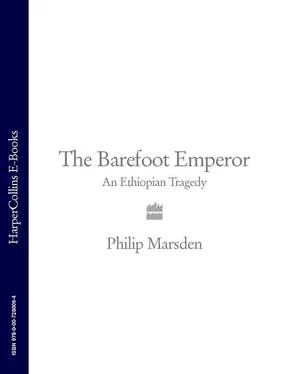‘He dismissed me with the sarcastic sentence, “I will have no direct intercourse with a sovereign who cuts off the hands and feet of his subjects.”’
Several things were at once clear to the others listening. Bardel and Tewodros had rehearsed this exchange, Bardel was making it up – he had never had an audience with Napoleon III – and Tewodros was struggling to control an unholy rage.
He told Consul Cameron to read out the letter from the French. It was not even from Napoleon, but from the Minister of Foreign Affairs, M. Drouyn de Lhuys, dated 23 March 1863. Just as the British government had through Plowden, the French urged Tewodros’s protection of Catholic missionaries: ‘all those governments worthy of calling themselves civilised have adopted the principle of freedom of belief’.
Like the British too, the French found it necessary to lecture Tewodros on his war plans. ‘Before going to war against powerful neighbours, it is as well to take note of their forces, and to guard against losing any advantage already acquired in rushing into such a hazardous undertaking.’
Tewodros had placed great faith in the Christian powers of Europe. This is what came back. The more he saw of Europeans, the more disappointed he was. In their world there seemed no clarity of alliance – Christian and Muslim fought on the same side. Privately the French envoy said one thing to him, the British another; when he asked for their support in defending himself, they said the same thing: don’t. He had taken a personal dislike to the two envoys, Bardel and Cameron. ‘The Frenchman is a madman, the Englishman an ass,’ he was reported as saying. The individuals now sitting at his feet were not, in his eyes, of the calibre of loyal John Bell or Walter Plowden.
He snatched the paper from Cameron’s hand. ‘Is this an answer to my letter? Napoleon may think himself great, but I am greater still. His genealogy is only of yesterday, mine I trace back to David and Solomon!’
Each of those sitting before the emperor, watching his anger, realised that something had changed. They had come to Ethiopia for their own reasons – duty, vocation, adventure. Many now decided that the time had come to leave. Those who did not looked back to that morning in the old palace at Gondar and remembered the sight of the raging Tewodros, and realised it had been their last chance.
19
Just over ten years had passed since Tewodros rebelled against Ras Ali and began his dazzling march to the throne. He had defeated Ras Ali and his mother Menen and Wube and Goshu and Biru, all the giants of old. The Yejju dynasty was no more, the kingdoms of Wag and Lasta were under his rule, Shoa and Tigray too. With the support of Abune Selama he had rid the Church of hundreds of years of division. He had purged and conquered, and put in place reforms to elevate the ancient kingdom back to its rightful place in God’s order.
In 1859, Tewodros had admitted to Plowden that it was all taking a little longer than he’d hoped. ‘Providence,’ he explained, ‘wills that some delay should interpose between my coronation and my perfect success.’
Four years later, he saw things more darkly. ‘It is evident I have deceived myself. This is a stiff-necked people, and it is necessary to chastise them before they enjoy the blessings which Providence has intended for them.’
The missionary Henry Stern saw the change in Tewodros as sudden: ‘he boldly burst the barriers which had hitherto restrained his impetuous temper, and threw aside the garb of sanctity which had disguised his true character’. Likewise in 1863, the acting French vice-consul Guillaume Lejean watched
In truth, the emperor’s behaviour had been pretty extreme for several years. With Tewodros, there were always spells of good humour, acts of forgiveness, moments of generosity, gestures that surprised everyone around him with their humility and grace. Yet they were more infrequent, and interspersed with such savage rage that few trusted him any more. him rid himself of ‘the last scruple which had restrained him on the edge of a terrible brink’.
Many put it down to grief. The moderating counsel of Bell and Plowden had gone, though most pointed to his losing the intimacy of Tewabach, his ‘good genius’.
In 1860, Tewodros had married again. Tirunesh Wube was the daughter of his former rival Dejazmach Wube – meaning that the daughter of each of his great enemies had become his wife. When Tirunesh produced an heir, Alemayehu, five hundred prisoners were freed in celebration. But the marriage was not a happy one. Tirunesh resented her husband, the upstart conqueror of her father’s kingdom. Little is known of their time together, in part because there was not much of it. But a story tells of him walking into her tent, and her failing to rise. ‘Iam conversing with a greater king than you,’ she muttered, continuing to read from the Psalms. Tirunesh – and Abune Selama – were now the only two who dared stand up to Tewodros.
He sent Tirunesh and their son Alemayehu to Meqdela, and took his pick from the women of the camp. ‘Since the death of my good queen,’ he said, ‘I have been leading an un-Christian and disreputable life.’
If there was, as Stern and Lejean suggest, a moment that marked Tewodros’s decline, it was the first few months of 1863. On 10 February, the emperor rode out of Debre Tabor. He was heading for Gojjam, where Tedla Gwalu, scion of the old ruling family, had recently built up a formidable band of rebels. Tewodros riding at the head of his vast army was still an impressive sight. A traveller’s description of him at this time gives a sense of his striking presence:
‘The forehead is high, and tends to be prominent. His eye is black, full of fire, quick and piercing. His mouth is perfect, and the smile, which during the conversation continually played upon it, was exceedingly agreeable, I may say fascinating … His manner was peculiarly pleasant, and even polite, and his general expression, even when his features were at rest, was one of intelligence and benevolence.’
For several days, the army marched south. When they approached the Blue Nile, Tewodros stood in the fort by the old Portuguese bridge and watched his forces pass. Hour after hour they flowed down the rocky slope. With Tewodros was Lejean, who recorded the sight: ‘Cavalry, infantry, baggage and followers all descend, or rather roll, like a thick cloud of dust, amidst the glittering of thousands of lances.’ Lejean estimated that 40,000 crossed the small bridge. Tewodros, ‘that indefatigable marcher’, then bounded up the slope. Lejean struggled behind him.
Конец ознакомительного фрагмента.
Текст предоставлен ООО «ЛитРес».
Прочитайте эту книгу целиком, купив полную легальную версию на ЛитРес.
Безопасно оплатить книгу можно банковской картой Visa, MasterCard, Maestro, со счета мобильного телефона, с платежного терминала, в салоне МТС или Связной, через PayPal, WebMoney, Яндекс.Деньги, QIWI Кошелек, бонусными картами или другим удобным Вам способом.












